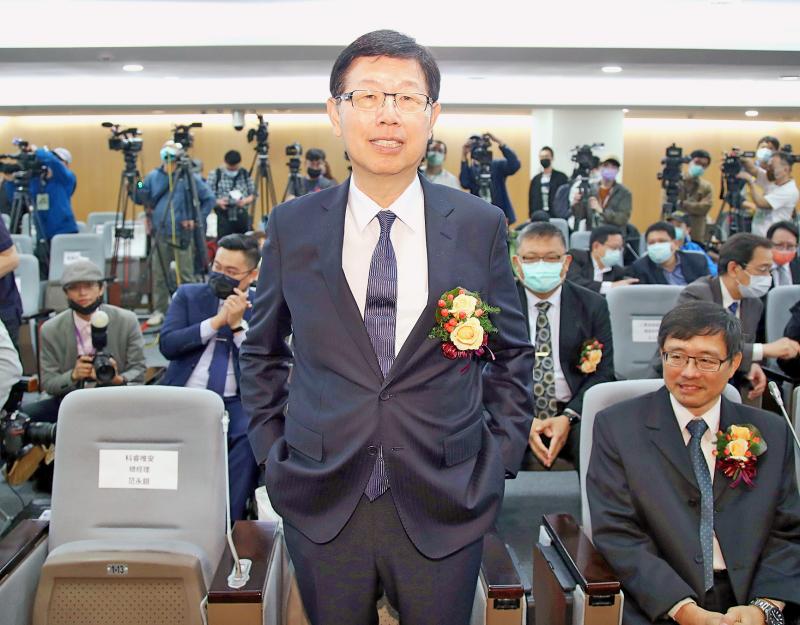Hon Hai Precision Industry Co (鴻海精密) has acquired a 5.03 percent stake in a Malaysian holding company with semiconductor interests to boost its presence in the IC sector.
Hon Hai, known globally as Foxconn Technology Group (富士康科技集團), said on Thursday that it spent 108 million ringgit (US$26.25 million) on the stake in Dagang NeXchange Bhd, which operates its information technology businesses through its subsidiaries.
Dagang NeXchange owns a 60 percent stake in SilTerra Malaysia Sdn Bhd, which runs 8-inch wafer facilities in Malaysia, Hon Hai said.

Photo: CNA
Through the investment in Dagang NeXchange, Hon Hai said that it would extend its reach in semiconductor and electric vehicle development in the ASEAN market.
SilTerra, which was founded in 1995, specializes in complementary metal-oxide semiconductor technologies that are used in a wide range of products, such as logic ICs, mixed-signal devices and radio frequency components, according to its Web site.
The company has also invested in other specialty areas such as silicon photonics, biophotonics and discrete power.
The investment comes after Hon Hai last month announced that it was teaming up with Yageo Corp (國巨), the world’s third-largest multi-layer ceramic capacitor supplier, to set up a joint semiconductor company named XSemi Corp (國瀚半導體) in Hsinchu to develop and sell small ICs.
Hon Hai chairman Young Liu (劉揚偉) earlier this year said that the company has prioritized developing small ICs priced at less than US$2, which are made from 6 or 8-inch wafers to avoid the sizable capital investment needed for 12-inch wafer production.

SEMICONDUCTOR SERVICES: A company executive said that Taiwanese firms must think about how to participate in global supply chains and lift their competitiveness Taiwan Semiconductor Manufacturing Co (TSMC, 台積電) yesterday said it expects to launch its first multifunctional service center in Pingtung County in the middle of 2027, in a bid to foster a resilient high-tech facility construction ecosystem. TSMC broached the idea of creating a center two or three years ago when it started building new manufacturing capacity in the US and Japan, the company said. The center, dubbed an “ecosystem park,” would assist local manufacturing facility construction partners to upgrade their capabilities and secure more deals from other global chipmakers such as Intel Corp, Micron Technology Inc and Infineon Technologies AG, TSMC said. It

NO BREAKTHROUGH? More substantial ‘deliverables,’ such as tariff reductions, would likely be saved for a meeting between Trump and Xi later this year, a trade expert said China launched two probes targeting the US semiconductor sector on Saturday ahead of talks between the two nations in Spain this week on trade, national security and the ownership of social media platform TikTok. China’s Ministry of Commerce announced an anti-dumping investigation into certain analog integrated circuits (ICs) imported from the US. The investigation is to target some commodity interface ICs and gate driver ICs, which are commonly made by US companies such as Texas Instruments Inc and ON Semiconductor Corp. The ministry also announced an anti-discrimination probe into US measures against China’s chip sector. US measures such as export curbs and tariffs

The US on Friday penalized two Chinese firms that acquired US chipmaking equipment for China’s top chipmaker, Semiconductor Manufacturing International Corp (SMIC, 中芯國際), including them among 32 entities that were added to the US Department of Commerce’s restricted trade list, a US government posting showed. Twenty-three of the 32 are in China. GMC Semiconductor Technology (Wuxi) Co (吉姆西半導體科技) and Jicun Semiconductor Technology (Shanghai) Co (吉存半導體科技) were placed on the list, formally known as the Entity List, for acquiring equipment for SMIC Northern Integrated Circuit Manufacturing (Beijing) Corp (中芯北方積體電路) and Semiconductor Manufacturing International (Beijing) Corp (中芯北京), the US Federal Register posting said. The

India’s ban of online money-based games could drive addicts to unregulated apps and offshore platforms that pose new financial and social risks, fantasy-sports gaming experts say. Indian Prime Minister Narendra Modi’s government banned real-money online games late last month, citing financial losses and addiction, leading to a shutdown of many apps offering paid fantasy cricket, rummy and poker games. “Many will move to offshore platforms, because of the addictive nature — they will find alternate means to get that dopamine hit,” said Viren Hemrajani, a Mumbai-based fantasy cricket analyst. “It [also] leads to fraud and scams, because everything is now